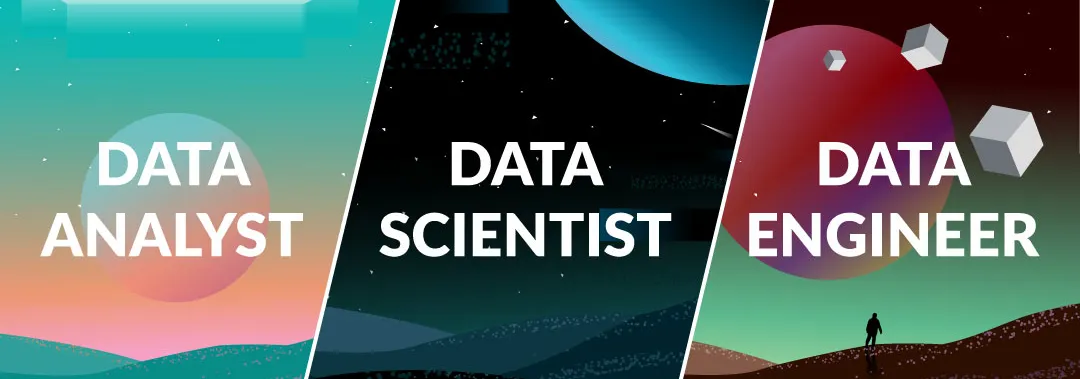The more you get involved in data science, the more you feel how broad the field can be. Data Science combines several disciplines and skills, going from business to computer science. This can be scary if you're new to the field, but keep in mind that you don't need to be an expert at everything.
When you look for data science jobs you lay into different titles and descriptions, making the job haunting even harder if you don’t understand the differences. The list of job types can be huge, including data scientist, data analyst, decision scientist, research scientist, data engineer, data specialist, machine learning engineer, and so on.
In this article, we focus on understanding the most common job roles and career opportunities in this industry. Also, we discuss the skill set and technical knowledge required for each role.
Top 4 Job Roles in Data Science
> Data Analyst
Data Analysts are responsible for developing, implementing, and maintaining analytic systems. They work with various departments in order to understand data needs and deliver insights for business decisions.
In this role, it's crucial to have product sense and strong analytical skills. The Data Analyst will be close to the decision-makers, helping to define business goals and metrics, track those metrics, and give updates on their performance.
Main Tasks:
- Pull data out of SQL databases.
- Produce data visualizations and reporting dashboards.
- Perform A/B tests.
- Identify critical metrics and KPIs.
- Processing and cleaning data.
- Perform statistical analysis and make predictive models.
Tools and Skills:
- Excel, BI Tools (Tableau, Power BI).
- R, Python, and SQL.
- Strong analytical skills.
- Strong communication skills.
- Data storytelling.
> Data Engineer
A Data Engineer position is related to creating and maintaining data infrastructure. This role requires strong software engineering skills, especially working with databases and large-scale processing systems.
Therefore, Data Engineers are mainly responsible for designing solutions along with data scientists to create optimal pipeline architecture. They build the infrastructure required for extraction, transformation, and loading of data from a wide variety of data sources.
Main Tasks:
- Set up data infrastructure/data warehouse.
- Deploy analytics programs and machine learning models.
- ETL (Extraction, Transformation, and Loading).
Tools and Skills:
- Strong software engineering skills.
- Machine learning, algorithms, and data structures.
- Python, Java, C++, and SQL.
- Cloud technologies (Azure, AWS, Hadoop).
> Machine Learning Engineer
This role sits at the intersection of data science and software engineering. It requires a great understanding of statistical and machine learning models, so it's more indicated for someone with a mathematics or statistics background, along with strong programming skills.
A Machine Learning Engineer has to implement scalable backend solutions to ship the models into production. In summary, this position will deal with the development of algorithms based on statistical models and scaling theoretical data science models to the production level.
Main Tasks:
- Data modeling and evaluation.
- Apply machine learning algorithms and libraries.
- Build algorithms based on statistical modeling procedures.
- Build and maintain scalable machine learning solutions in production.
Tools and Skills:
- Machine learning.
- Statistics and mathematics.
- Backend engineering.
- Python, C/C++, Java.
> Data Scientist
This is the most desirable position and it has been called "The Hottest Job of the 21st century". A Data Scientist masters a range of skills from handling raw data to sharing their findings with stakeholders. Therefore, within all positions in data science, this is the most generalist for including basically all steps/functions in a data science project.
Data Scientists know how to convert business problems into data science problems and use advanced analytical and technical skills to solve them. Some steps they have to develop include processing and cleaning data, performing Exploratory Data Analysis (EDA), and building machine learning solutions. Besides, they are great communicators and know how to share their results.
Main Tasks:
- Collect, process, and clean data.
- Perform Exploratory Data Analysis (EDA).
- Build machine learning models.
- Create visualizations to communicate findings.
- Interpret the data to find business solutions.
- Communicate with stakeholders.
Tools and Skills:
- Strong problem-solving skills.
- Statistics and machine learning.
- Great communication and presentation skills.
- Data storytelling.
- Python, R, SQL.
Reading Data Science Job Descriptions

A piece of important advice for job searchers is to read the job descriptions carefully. Even though the different roles in data science can be well defined, many companies mix them or use inappropriate job titles. You can find Data Scientist roles named as Data Analyst or the opposite. Also, it's common to encounter hybrid Data Engineer/Data Scientist positions.
Therefore, the best way to know if the position suits you is by reading the description and identifying the tasks, tools, and skills required. This will allow you to apply to jobs you’re already qualified for, or develop specific data skill sets to match the roles you want to pursue.
Final Thoughts
In this post, we explored the most common job positions in the data science industry. However, this field is vast and it's still growing, so we can find many other types of roles and job titles in the market.
Even though the skills and tools required may vary between roles, some skills and knowledge are crucial to any data science position, such as analytical skills, programming, and good communication. Besides, within that various tools used in the field, Python is still the most predominant.
Another point to highlight is that although theoretical knowledge and technical skills are the most important part to pursue a data science position, this field usually requires a higher education level. There is no specific degree recommended since is a multidisciplinary field but the most common are computer science, statistics, mathematics, bioinformatics, or related fields.
I hope this can help you decide which job roles to apply in this industry.
Thanks for reading!
This article was written by Camila Bernardi (read more about Data Science topics on @cmbernardi).




